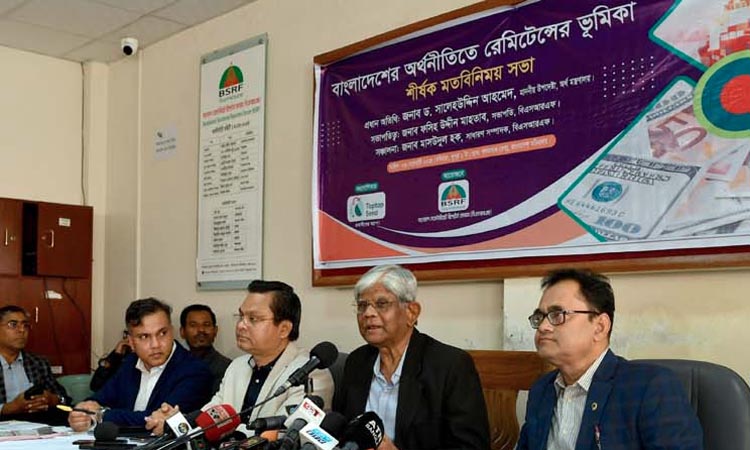News Flash
News Flash

DHAKA, Feb 9, 2025 (BSS) – Finance Adviser Dr Salehuddin Ahmed today said that the country’s macroeconomy is now in stable state although not fully.
“Our capacity, macroeconomic stability and balance are more or less stable although the current account balance and financial account was negative few months back,” he said.
The Finance Adviser was addressing a views-exchange meeting on “The role of remittance in Bangladesh’s economy”, held at the media center in Bangladesh Secretariat.
He said due to good remittance inflow and export earnings, the current account balance and financial account are now showing positivity while stability has been restored more or less in the macroeconomy although not fully.
Bangladesh Secretariat Reporters Forum (BSRF) and Taptap Send jointly organized the meeting.
Presided over by BSRF president Fasih Uddin Mahtab, its general secretary Masudul Haque moderated the event.
Taptap Send coordinator Mahmud Monir also spoke.
The Finance Adviser said many noted economists of the country are advocating at one hand for mobilizing more revenues, but on other hand reducing tax and VAT. But, the reality is that the tax-GDP ratio in the country is very low, he added.
Dr Salehuddin said the country is now witnessing more than $2 billion as remittance every month. “Confidence has now been restored among the expatriate Bangladeshis and they now mostly send money through banking channel instead of Hundi,”
He said most of the Bangladeshis who go abroad are unskilled while the maximum of the Bangladeshis in abroad usually do low-tier jobs like work as cleaners.
In comparison, the Indians, Sri Lankans and Pakistanis do desk jobs like as managers and assistant managers as they have good academic background and language efficiency, he added.
“If we can provide necessary training to the job seekers who want to go abroad, then they could earn more…the expatriates usually send money for their relatives, near and dear ones and for the dependents…they are the ‘unsung hero’,” he added.
He said the big challenge is that many of the expatriates do not utilize their hard earned money in productive sectors or making hefty savings…rather spend those in non productive sectors like constructing buildings at their village without thinking of good returns or a sound ‘back up’.
The Finance Adviser also stressed on sending more skilled workers in a transparent way so that they could lead a decent life abroad.
“From our side and policy side, there were failures in the past and we’re trying to streamline those,” he added.
Dr Salehuddin said the interim government wants to leave a footprint before the successive government.
“We won’t be able to accomplish everything or carry out all the reforms. But, at least the people are convinced what we are doing while the successive government should continue …we may carry out some short and mid-term reforms,” he added.
But, he said the long-term reforms are political issues and those who would come afterwards would have to take the responsibility.
Regarding the issue of increasing VAT, he said the government has already reduced VAT on some items, but if the increased VAT on all items is reduced, then how come the revenue generation would be enhanced, he questioned.
The Finance Adviser said that the World Bank and the IMF do not suggest the government to lower allocations against the health, education and social safety net sectors. “We won’t reduce allocations in such sectors,” he said.
“But last but not the least, some say that nothing has happened …we are very inefficient. But, it’s not true…definitely something is happening. Whatever we have inherited, there was a big injury (inside the economy). We’re trying to salvage it,” he added.
He said the development partners are happy with the performance of the government as the IsDB want to lend Bangladesh with $500 million for import of fertilizer.
Answering to a question on Probashi Scheme of the Universal Pension Scheme, he said that the Nordic countries like Norway, Sweden and Netherlands are the best welfare states.
He informed that the government is trying to make the Universal Pension Scheme more time befitting … “Whatever time we have left, at least we can initiate the process”.
Replying to another question on whether the government has any plan to raise the incentives on remittance, the Adviser declined to elaborate further right at this moment.
He informed that the ADB has already come up with $500 million in last December while the World Bank is likely to give $500 million more in June side by side the IMF would also release their support in June.
“Our resource gap is big and we definitely need resources … if our debt service liability increases, then we will be again under pressure …. We have never become defaulter in paying loans and we’ll never default,” he added.
The Finance Adviser said that the macroeconomy of Bangladesh is not bad, adding, “We’ll definitely try to build a welfare-oriented and equity based state.”
In the short-term, Dr Salehuddin said his aim was to fix the financial and the banking sector as well as lowering the trend of default loans or Non Performing Loans (NPLs).
Taptap Send Coordinator Mahmud Monir said that this is totally a mobile app service through which money can be sent from USA, Europe, Canada, Australia and UAE to Bangladesh alongside to various countries of Africa, Asia, and Latin America in a secured and speedy manner.